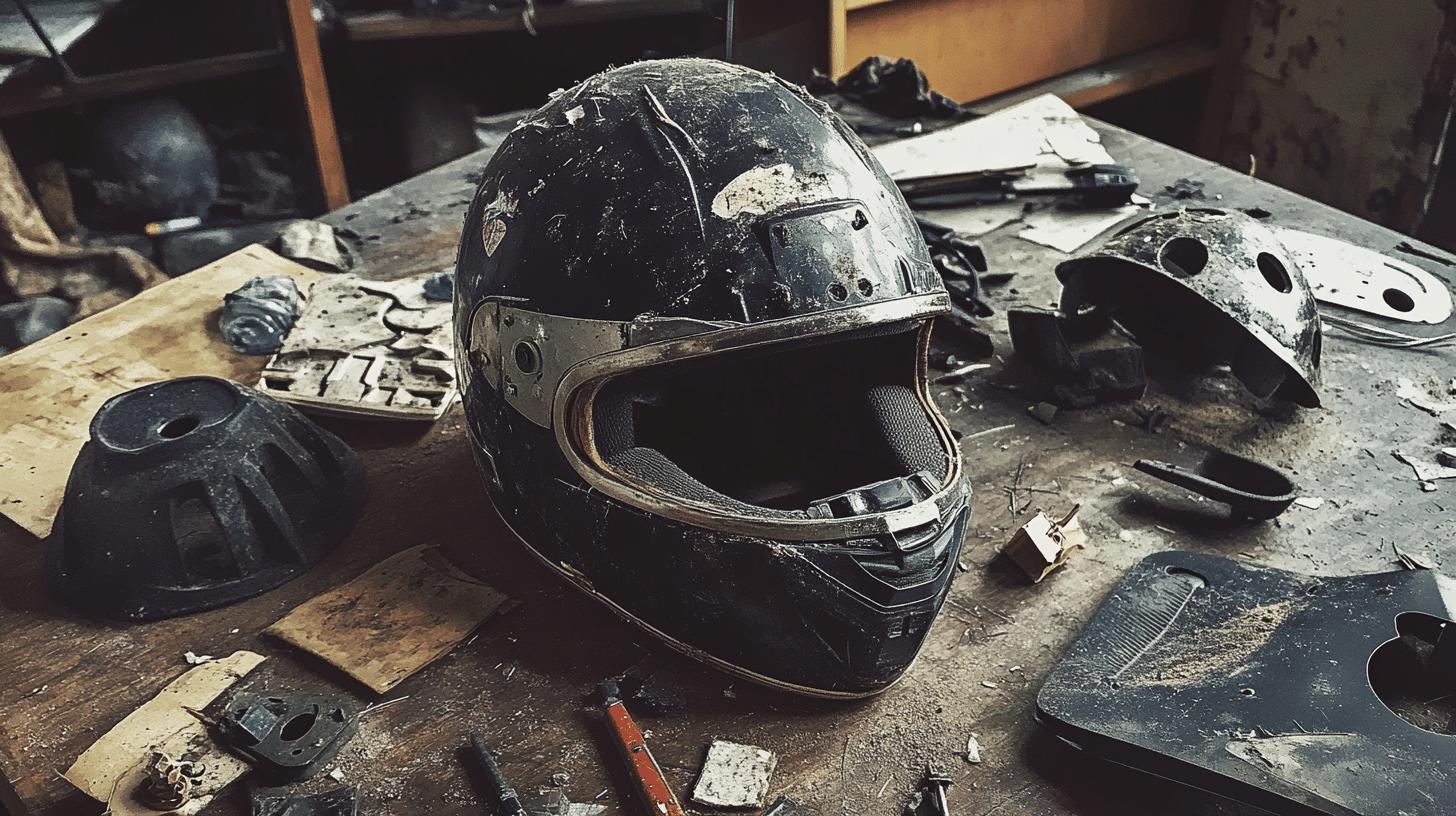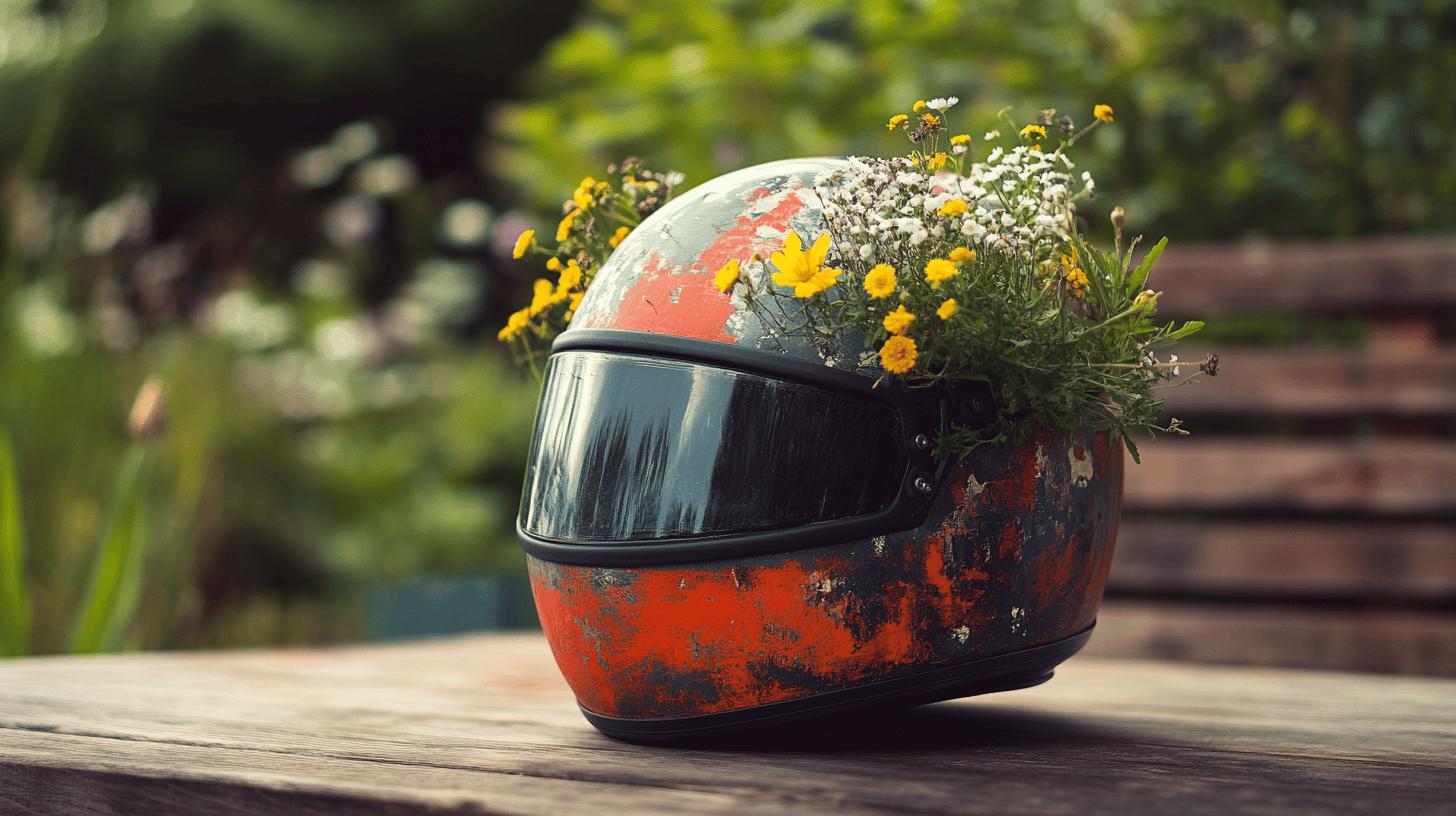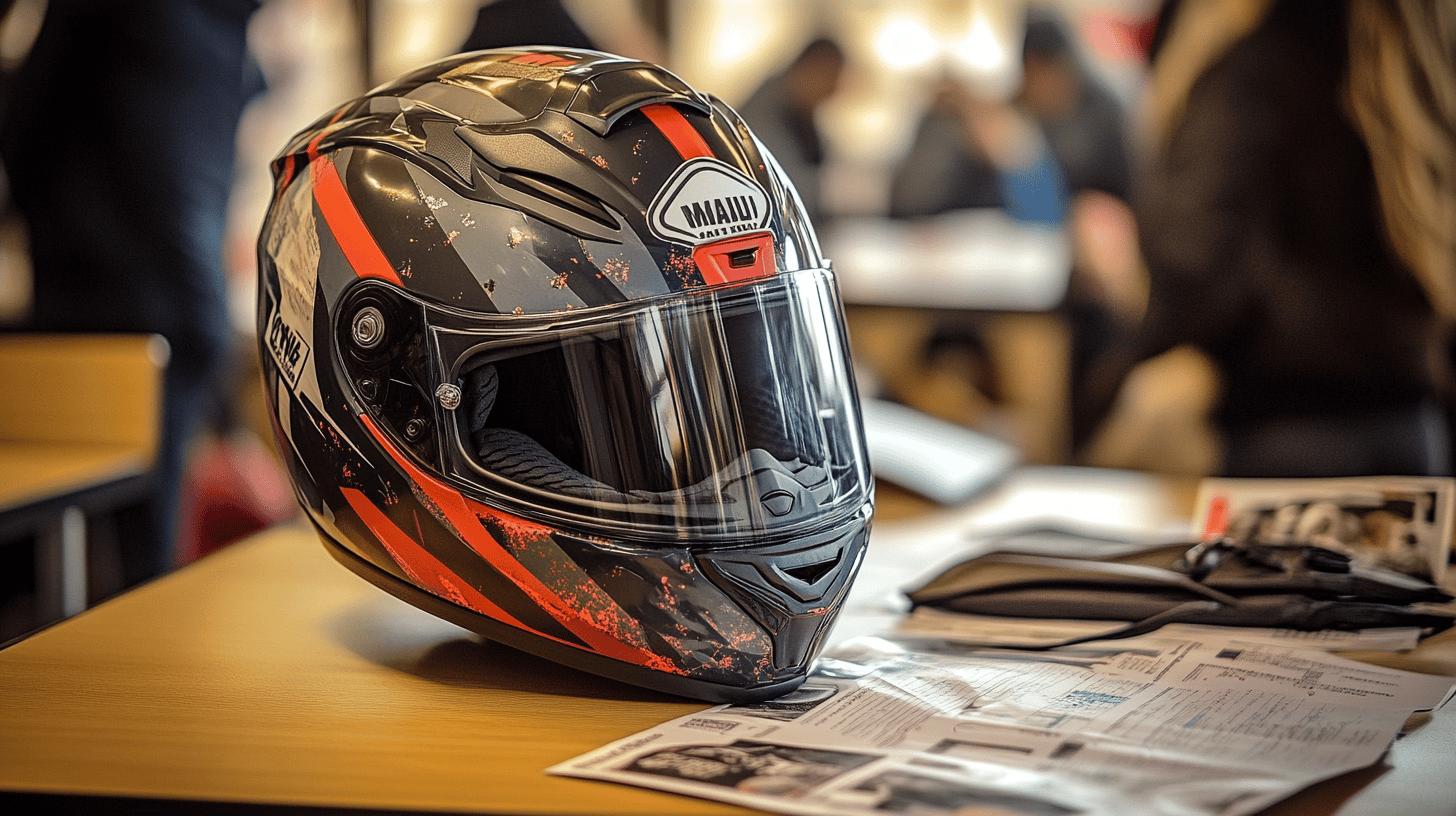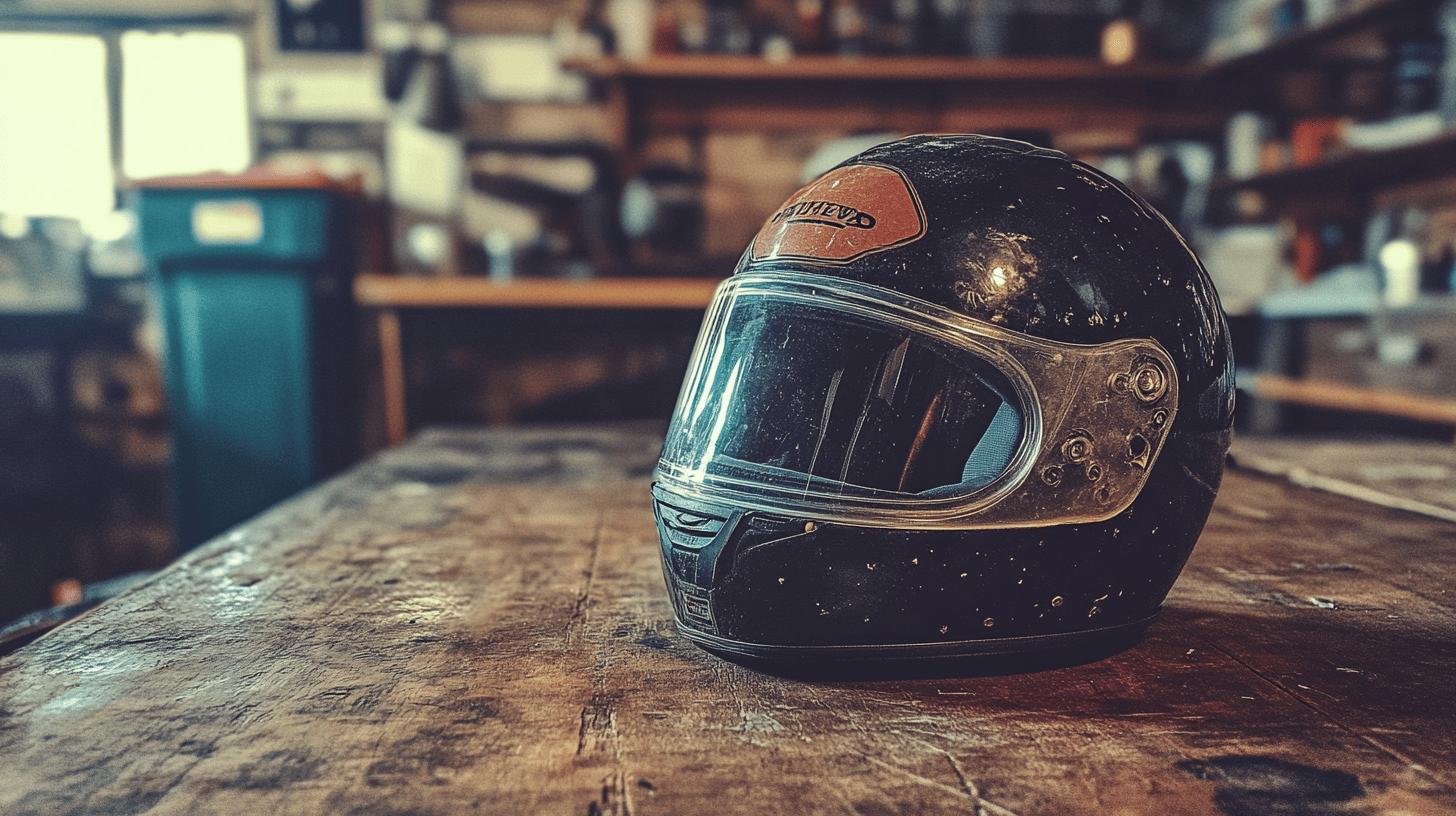Why let an old helmet gather dust when it can ignite creativity instead? Motorcycle helmets, once dearly trusted protectors, are often discarded to make way for fresh gear. But these helmets can find new life beyond their protective past.
This article will explore inventive ways to recycle, upcycle, and donate your tired helmets—breathing new purpose into them and supporting environmentally and socially beneficial causes.
From tackling helmet recycling concerns to sparking a creative wave with upcycling ideas, discover thoughtful ways to retire your helmet with dignity and flair. Dive into this engaging guide and transform your outdated gear into something rewarding.
Recycling Options for Old Motorcycle Helmets

Recycling old motorcycle helmets is crucial for reducing waste and promoting environmental sustainability. Rather than allowing these helmets to contribute to landfill problems, recycling offers a way to repurpose their materials effectively.
By breaking down helmets into their constituent components, such as foam and plastic, they can be processed individually, ensuring that valuable materials are not wasted.
The recycling process for helmet materials involves several steps. Initially, the helmet is disassembled, separating the outer shell from the foam and any additional components. Each part is then sorted according to material type.
The plastic shell can be melted down and reused in new products, while the foam is often repurposed for other applications, such as packaging materials. It is important to remove and recycle any electronic parts, like audio devices, separately to avoid contamination. Checking local recycling guidelines ensures that these materials are processed correctly, adhering to environmental standards.
Identifying local recycling centers that accept motorcycle helmets is a straightforward task. Many facilities now recognize the importance of recycling helmet materials and offer specific programs for their disposal.
By participating in these programs, individuals contribute to a more sustainable ecosystem, preventing helmets from cluttering landfills. The benefits extend beyond environmental sustainability, as recycled materials can be utilized in innovative ways, supporting industries that rely on recycled plastics and foams.
| Recycling Option | Benefits |
|---|---|
| Local Recycling Centers | Reduces landfill waste |
| Manufacturer Take-Back Programs | Encourages responsible production practices |
| Community Recycling Events | Promotes local environmental initiatives |
| Specialized Foam Recyclers | Ensures foam is repurposed effectively |
Creative Upcycling Projects for Old Helmets

Upcycling old motorcycle helmets into creative projects not only gives these items a new lease on life but also reduces environmental impact by diverting them from landfills. The concept of upcycling involves transforming unwanted products into new, functional or aesthetic items, aligning with sustainable practices.
This creative approach offers an array of possibilities, from practical uses to decorative enhancements. As helmets are no longer safe for riding once compromised, upcycling ensures they serve a new purpose without risking safety on the road. By reimagining these protective shells, individuals can craft unique pieces that reflect personal style and ingenuity.
-
Transform into planters for indoor or outdoor greenery
-
Convert into storage containers for small items or tools
-
Craft into pet beds for small animals
-
Create birdhouses with a quirky twist
-
Design lamps or lampshades for ambient lighting
-
Construct bookends with a bold aesthetic
-
Develop Halloween costumes using the helmet as a base
-
Turn into art pieces, such as painted sculptures or wall hangings
While exploring upcycling projects, creativity knows no bounds. Each helmet can become a bespoke piece, tailored to individual tastes or household needs. These projects provide an opportunity to experiment with artistic designs, recycling materials in inventive ways.
However, it's essential to remember that once a helmet is repurposed, it should never be used again for riding. The structural integrity required for safety is compromised, making upcycling the ideal solution for a helmet's afterlife. By ensuring helmets are kept off the road, riders contribute to safety while enjoying the satisfaction of creating something truly unique.
Donation Opportunities for Used Helmets

Donating old motorcycle helmets can significantly benefit educational institutions and training programs. These helmets are invaluable for safety demonstrations in motorcycle schools and emergency training facilities, where they serve as practical teaching tools. By contributing to these organizations, donors support the education of new riders and enhance safety awareness.
Finding donation centers or programs is a straightforward process. Many organizations openly welcome helmet donations, and a quick search for "donate motorcycle helmet near me" can yield local options. Motorcycle clubs and community centers often have connections with schools or training facilities that would gladly accept such contributions.
Some manufacturers may also offer take-back programs, recycling or repurposing helmets in a responsible manner. By reaching out to local motorcycle dealers, individuals can often find additional information on donation opportunities and specific program details.
Besides supporting educational endeavors, donating helmets can offer tax benefits. Donors might be eligible for tax deductions when contributing to recognized nonprofit organizations. Additionally, donating fosters community support and engagement, as it demonstrates a commitment to safety and education. By giving helmets a second life in training environments, donors contribute positively to their communities and promote a culture of learning and safety.
Safe Disposal Methods for Expired Helmets

Motorcycle helmets are engineered for a single impact, ensuring maximum protection during a crash. Once compromised, their structural integrity is weakened, making them unsafe for future use. Reusing damaged or expired helmets for riding can significantly increase the risk of injury in the event of an accident.
Proper disposal of these helmets is paramount to prevent them from being reused inappropriately or contributing to landfill waste. By ensuring expired helmets are disposed of correctly, riders not only protect themselves but also contribute to environmental sustainability.
-
Check Local Recycling Guidelines: Verify if your local recycling center accepts helmets. Some centers have specific protocols for processing helmet materials.
-
Remove Electronic Components: Carefully detach any electronic parts, such as audio systems or lights, and recycle them separately to avoid contamination.
-
Disassemble the Helmet: Separate the foam, shell, and any other components to facilitate recycling. This allows each part to be processed according to its material type.
-
Contact Specialized Recyclers: Reach out to companies that specialize in recycling foam and plastics, ensuring these materials are repurposed effectively.
-
Dispose of Non-Recyclable Parts: If certain parts cannot be recycled, follow local waste disposal guidelines to ensure they are discarded responsibly.
Trade-in programs offer an alternative disposal method, with some manufacturers providing discounts on new helmets. These programs encourage responsible disposal by incentivizing riders to replace expired helmets with new, safer models. By participating in trade-in offers, riders can benefit financially while supporting sustainable practices and ensuring their safety equipment is up-to-date.
Innovative and Artistic Uses for Old Helmets

Old motorcycle helmets, once removed from their primary purpose of safety, can serve as canvases for creative expression. Transforming helmets into personalized art projects or decorative items breathes new life into them, offering both aesthetic and practical benefits.
Painting these helmets can convert them into unique art pieces, showcasing intricate designs or abstract patterns that reflect personal style. Such transformations not only keep helmets out of landfills but also allow individuals to create statement pieces for their homes or gardens.
Beyond painting, helmets can be adorned with a variety of materials, including decals, fabrics, and other embellishments, turning them into captivating decorative items.
-
Create a vibrant wall clock using the helmet as a base.
-
Design a unique lampshade by cutting patterns for light to shine through.
-
Transform into a whimsical birdhouse with painted designs.
-
Craft a mosaic art piece by breaking it down and reassembling the pieces.
-
Develop a themed planter by filling the interior with soil and plants.
Exploring the construction of helmets through artistic projects offers educational insights into the materials and engineering involved in their design. By breaking down a helmet, one can examine the layers and components that contribute to its protective capabilities.
This hands-on experience can be both enlightening and inspiring, providing a deeper understanding of helmet technology while fostering creativity. Engaging in such projects allows for a melding of art and education, as individuals repurpose old helmets into meaningful creations.
Final Words
Exploring what to do with old motorcycle helmets not only helps reduce waste but also opens up a world of creative and socially beneficial possibilities. From recycling at local centers to upcycling into art projects and donating for educational purposes, each method carries unique advantages.
These solutions not only prevent helmets from ending up in landfills but also encourage innovative reuse. Consider these options for sustainability and impact. It's a rewarding way to part ways with a trusted companion of many rides.
FAQ
What do I do with old motorcycle helmets?
Old motorcycle helmets can be recycled, upcycled, donated, or safely disposed of. Recycling breaks them into separate material components, while upcycling offers creative uses. Donation supports training and education, and safe disposal avoids misuse.
Where can I donate motorcycle helmets?
Motorcycle helmets can be donated to educational institutions, motorcycle training schools, or emergency services. These organizations often use them for safety demonstrations or training activities.
Can old helmets be recycled?
Yes, old helmets can be recycled by separating their foam and plastic components, which can then be processed at recycling facilities. Check your local recycling guidelines for acceptance.
What are some creative upcycling projects for old helmets?
Upcycling projects for old helmets include using them as planters, storage containers, or art pieces. They can also be transformed into pet beds, birdhouses, lamps, Halloween costumes, or bookends.
Is a 20-year-old motorcycle helmet still good?
A 20-year-old motorcycle helmet is typically not safe for riding. Helmets have a recommended lifespan and degrade over time. It should be recycled, upcycled, or disposed of safely.
Where can I find helmet recycling centers near me?
To locate helmet recycling centers near you, consult local recycling facilities, municipal waste departments, or online directories for specific guidance.
What should be done with expired helmets?
Expired helmets should be disposed of safely to prevent reuse. Some manufacturers offer trade-in programs, or you can follow community disposal guidelines to recycle helmets correctly.
Can you sell second-hand motorcycle helmets?
Selling second-hand helmets is possible, but many buyers are cautious due to safety concerns. Helmets should not be used for riding if they’ve been involved in accidents or are past their lifespan.
What are effective methods for disposing of old motorcycle helmets?
Effective disposal methods include recycling, donating to training programs, or utilizing trade-in offers from manufacturers. Always ensure helmets aren’t reused improperly for safety reasons.
Does Goodwill take motorcycle helmets?
Goodwill's acceptance of motorcycle helmets varies by location. It's advised to check with your local Goodwill to see if they are currently accepting helmet donations.

Mark Anderson is a trusted expert with over 25 years of riding experience. At 56, his deep knowledge of long-distance touring and participation in major motorcycle rallies makes him a reliable source for gear recommendations on ProtectiveGearz. Mark’s decades of firsthand experience ensure his advice is authoritative and valuable to riders seeking expert guidance.



